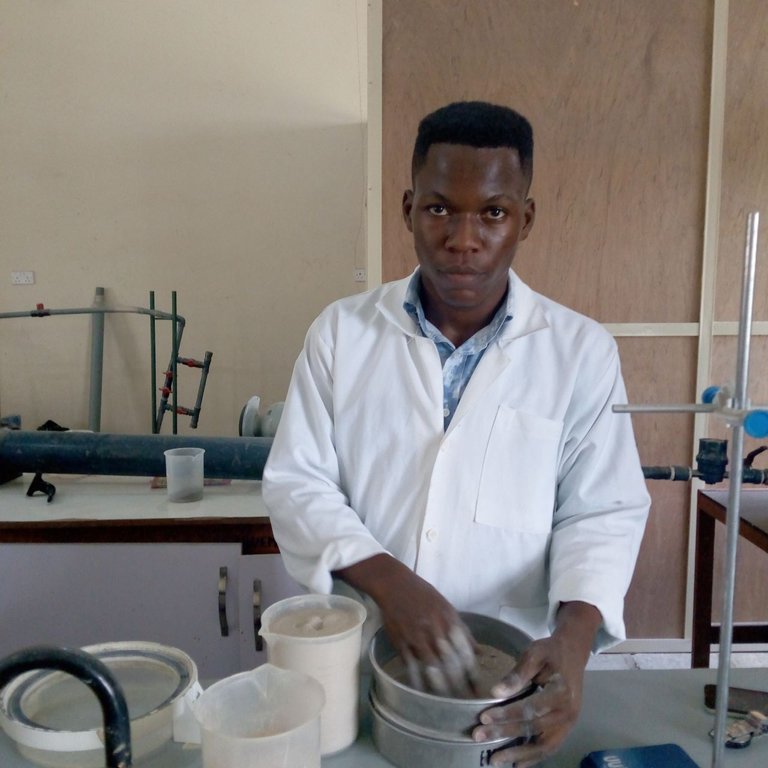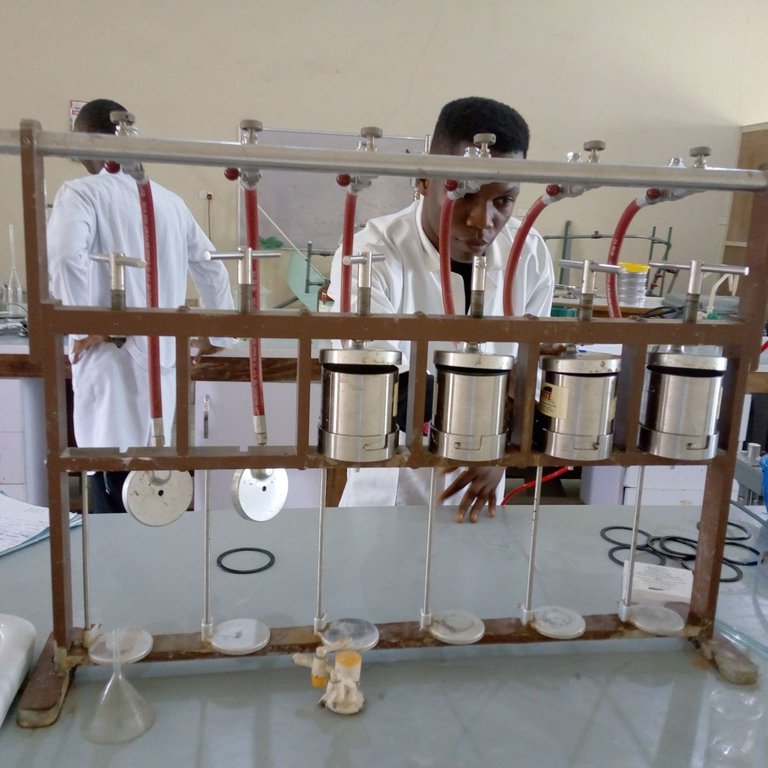Enhancement of Local Clays for Drilling Fluids Applications
Few days back, I took this clay and drilling mud project and finally I successfully completed the research project and it was entitled “Enhancement and Improvement of Local Clays in Uyo Local Government Area (LGA) for Drilling Mud Formulation.”

Own Image: Clay Samples Preparation
In order to minimize the rate by which Nigeria oil and gas companies import foreign bentonite for the purpose of successful drilling of wells, for oil and gas extractions, local clays were taken from Afaha Oku and Efiat Offot. These local clays were used in formulating two different drilling muds.
Study Area
The locations (Afaha Oku and Efiat Offot) were local clays were being obtained from are both villages in Uyo Local Government Area (L.G.A). On the other hand, Uyo LGA is one of the Local Government Areas and the capital of Akwa Ibom State. The city is vast with a land space of about one hundred and forty square miles. According to Wikipedia, Akwa Ibom is situated in the coastal southern part of Nigeria.
The properties of the local clays such as density, filtrate volume and ph were experimentally determined. In furtherance, the properties of the local clay muds were being tested for suitability via comparing their properties with those of the standard American Petroleum Institute (API) bentonite.
Now, from the comparison, it was crystal clear that the local clays were not fitting for drilling fluid formulation in their naturally occurrence state, as they were found to possess very low and bad gel strength, plastic viscosity, yield point and apparent viscosity (rheological properties) as well as other properties such as pH and density.
This is due to the fact that the Afaha Oku and Efiat Offot clays lacked the capacity to swell as there was no attraction between the clay and water in the formulated drilling fluid. More so, this scenario with the formulated drilling mud using the local clays could also be attributed to the low presence of sodium cations in the local clay deposits.

Own Image: Filter Press Set-up for Filtrate Volume Measurement
However, in Petroleum Engineering, the process of making a low-quality clay to improve in its properties and performance as pertaining to drilling mud formulation is termed “beneficiation”. In all cases, beneficiation is done by the addition of relevant chemicals and additives. In this case, the Afaha Oku and Efiat Offot clays (local clays) were being beneficiated by the addition of barite, carboxyl methylcellulose and soda ash in considerable concentrations to the local clays.
Worthy of note is that upon beneficiation at a concentration of 42.9g carboxyl methylcellulose, 10g soda ash and 10g barite to 350mL of the local clays, the yield point, apparent viscosity and plastic viscosity of the Efiat Offot clay mud improved drastically. Also, the yield point, plastic viscosity and apparent viscosity of Afaha Oku clay mud increased in their respective percentages. The pH of the local muds also increased at a concentration of 10g of soda ash to 350mL of the local clay mud. Furthermore, the results for the filtrate volume revealed that the Efiat Offot and Afaha Oku mud improved at large percentages. Therefore, the local clays showed good properties when compared with bentonite upon beneficiation. This then implies that there are chances of formulating a good drilling mud from the obtained local clays.
Results of the research work and their discussions will be published in my subsequent posts. I hope you check back!!
References
http://www.ijesmjournal.com/issues%20PDF%20file/Archive-2015/JUlY-SEPTEMBER-2015/3.pdf
[ENHANCING THE PERFORMANCE OF UBAKALA CLAY FOR USE AS DRILLING MUD.](http://futospace.futo.edu.ng/xmlui/bitstream/handle/123456789/1445/Igwe.pdf?sequence=1&isAllowed=y)
[Formulation of water-based drilling fluid using local materials](https://www.researchgate.net/publication/292877234_Formulation_of_waterbased_drilling_fluid_using_local_materials)
[Properties and application of Nigerian bentonite clay deposits for drilling mud formulation: Recent advances and future prospects](http://jsaer.com/download/vol-5-iss-3-2018/JSAER2018-05-03-359-365.pdf)
[EVALUATION OF THE EFFECTIVENESS OF LOCAL CLAY FROM EBONYI STATE, NIGERIA AS A SUBSTITUTE FOR BENTONITE IN DRILLING FLUIDS](https://www.eajournals.org/wp-content/uploads/Evaluation-of-the-Effectiveness-of-Local-Clay-from-Ebonyi-State-Nigeria-as-a-Substitute-for-Bentonite-in-Drilling-Fluids.pdf)
http://eprints.covenantuniversity.edu.ng/12564/1/1-s2.0-S0169131717301102-main.pdf
Shared on Twitter
https://twitter.com/Iam_LilTom/status/1218494802699980803
Good analysis, I am really glad to find this publication, since my articles are related to the oil industry, but sometimes I feel that it did not manage to impact the steemit audience as I would like, perhaps because I have not come across any colleagues who share the same content as me.
You have really gone for a part of the content in the branch of petroleum engineering very important as it is the drilling fluid, because depending on how the drilling fluid is, to that extent you can build and drill the oil well.
My question is: How deep are most of the oilfields in Nigeria? And I ask you the question because I see that you were interested in investigating the economic feasibility of being able to work with local bentonite clay, or suddenly, as the research study shows, evaluate the possibility of continuing to export. Since at least we here in Venezuela only drill mostly oil wells that are only drilled with bentonite water gel muds up to approximately 7000 feet, so our biggest concern is oil based drilling muds.
Observing your dedication to studying the feasibility of using local clays for drilling mud, I wonder: Are the wells in Nigeria being drilled to shallow depths?
One last question I have, according to what I read in this article, the research you carried out determined that the local clay needs to have a series of chemical elements added to it to improve the performance of certain properties such as the gel property, the yield point, the viscosity, and in short the properties that the mud must have to fulfill the functions of the drilling mud.
However, I do not know if you have investigated that if other elements were added, a drilling mud with local clay could be used instead of imported clay, but my other doubt is: and if the other additives are added, perhaps the drilling costs can be economically higher? or have the calculations been made, and still it is better to use local clay?
The question is because you know that in drilling everything has to be economically feasible, and as far as you can see, with all the elements that are going to be added to the local clay suddenly it is necessary to evaluate the costs based on the cost of the imported clay, so that based on better performance and low costs the best option can be selected.
I am fascinated by your article, since it shows the study and research to evaluate a national product, as it is in your case the local clay, greetings @tomlee, we continue reading, I hope to see more of your publications soon.
An excellent addition to this post :)
!ENGAGE 50
Thank you for your appreciation, it's very important to me.
@carlos84 you have received
50 ENGAGEfrom @abh12345!View and trade the tokens on Steem Engine.
I'm glad you found interest in the article.
One of the aims of these research work was to see how to develop local content. And one of such contents are clays considering the fact that there are available in Nigeria in vast amounts.
Yes. There are shallow wells in some parts of Nigeria and water based muds could quite be useful. More so, there are lots of appraisal wells being drilled here in the country. And as you know, these types of wells are usually shallow in nature. However, there are also deep oil wells in the country.
Also, use of chemicals in beneficiating these local clays is quite expensive but not as expensive as the importation of foreign bentonite. So, cost could be reduced. More so, other related studies have shown that there are some locally sourced materials that could go for these chemicals such as potato starch etc.
In that case these local additives could be used thereby reducing cost.
Thank you.
Excellent @tomlee, then the study you conducted revealed that adding new components to the local clay to improve the rheological properties is economically feasible compared to importing foreign clay. So for me it is an excellent study that you did, I hope to continue to see new contributions like this in the study and evaluation of drilling fluids. Greetings, friend.
Exactly!
I'll sharethe results obtained very soon.
Hi, thanks for the post! I have included a link and a short description in my daily Science and technology digest, and you'll receive a 10% share of that post's rewards.
Thank you